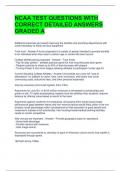CORRECT DETAILED ANSWERS
GRADED A
Additional expenses go toward improving the facilities and providing departments with
funds necessary to travel and buy equipment
Trust fund - Answer-A fund comprised of a variety of assets intended to provide benefits
to an individual when they reach a certain age or certain life event occurs
College athlete paying proposals - Answer-- Trust funds
- Pay-for-play system - athletes paid per game for how long they play each game
- Require coaches to share up to 50% of their bonuses with players
- Turning Power 5 into minor league allowing athletes to participate if under age 23
Current Standing College Athletes - Answer-Universities can cover full "cost of
attendance" (in addition to tuition, fees, room and board, and books now cover
commuting costs, cell phone fees, and other personal expenses)
Vary by university (Cincinnati highest, FAU, FSU)
Arguments for: only $11 of $105 million revenues is reinvested to scholarships and
grants-in-aid; TV rights broadcasting; treated more like athletes then students; improve
balance by offering value based on worth to the team
Arguments against: students not employees, and paying them would cause larger
performance gaps between teams and non-revenue sports would likely suffer or be non
existent; small percentage make it professional so free education is great benefit and
investment; outside of full scholarship, free housing/meals/medical/clothing/facilities;
needs to remain competitive
Why venues are important - Answer-- Provide geographic base for operations
- Home field advantage
- Provide owners with revenues
- Host mega events
Structures are monuments to centrality of sport in American culture and to how wealth is
expressed through sports
160 built during 1990s
, Cost tripled from 1990s to 2005-10 (luxury features, more expensive areas)
Current trends of sport facilities - Answer-- Seating capacities are shrinking, but overall
footprints are growing larger as more "premium zones" are added
- Retractable roofs
Costs: materials, labor, land, technological enhancements, zoning fees/permit
applications, business relocation and city infrastructure, finishing touches/aesthetics
(huge gape existing between initial and final cost estimates)
Private funding - Answer-If a sport project exhibits the characteristics of a private good
or service, its benefits accrue exclusively to the franchise and spectators at the games.
If there are not benefits received by the general community, then it is reasonable to
expect the franchise and fans to pay all of the costs and there should be no public
subsidy.
Public funding - Answer-A public good or service is perceived by a community as
contributing health, knowledge, safety, or welfare benefits to all residents in the
community.
Because all residents benefit, it is equitable that they should all pay through the tax
system so public subsidy would be appropriate
WW2 and Great Depression started this as resources became drained in leagues
Sources: bonds, general taxes, selective taxes
Civic Development Era - Answer-Period after WWII 1950-70
- major league stadiums increased from 32 to 52, 60% publicly owned
- gov't finance and construct facilities
Characteristics during this era: local gov'ts are landlords and franchises were tenants;
teams pay annual rent and shared revenues from parking and concessions; basic
facilities;
Public Subsidy Era - Answer-Period after CDE from 1970-1984
- 20 of 22 facilities constructed during this time were 90-100% funded by local gov'ts
- Growth occurring in overall number of professional sports franchises, attendance, and
tv viewership
Sport franchises increasing in value; precedent funding was responsibility of the public;
cities build new publicly financed venues to attract teams migrating to untapped markets
Transitional Era - Answer-Period after PSE 1985-1994
- Governments progressively diminishing role in financing



